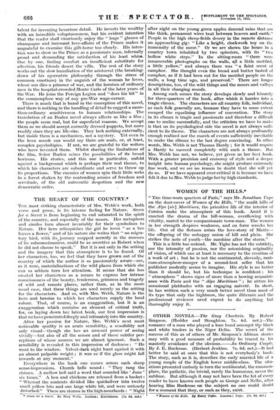THE HEART OF THE COUNTRY.* Tim most striking characteristic of
Mrs. Webb's work, both verse and prose, is its intense feeling for Nature. Seven for a Secret is from beginning to end saturated in the spirit of the country, and especially of the moors. Her metaphors and similes turn almost invariably for their symbolism to Nature. Her hero relinquishes the girl he loves " as a bee leaves a flower," and of his nature she writes that " no migra- tory bird, with its6journey mapped secretly in the recesses of its subconsciousness, could be as secretive as Robert when he did not choose to speak." But it is not only in the setting and the imagery that this atmosphere is to be found. Of her characters, too, we feel that they have grown out of the country of which the author is so passionately aware—are, as it were, materializations of the wild places from which she can so seldom turn her attention. It seems that she has created her characters as a means to express her intense consciousness of the beauty, tenderness, grimness and tragedy of wild and remote places, rather than, as in the more usual case, that these things are used merely as the setting for the characters. And so, with Mrs. Webb, Nature is the hero and heroine to which her characters supply the local colour. That, of course, is an exaggeration, but it is an exaggeration which contains an element of critical truth, for, on laying down her latest book, our first impression is that we have Penetrated deeply and intimately into the country.
After her passion for Nature, Mrs. Webb's next most noticeable quality is an acute sensibility, a sensibility not only visual—though she has an unusual power of seeing vividly—but also of all the senses and of those subtler per- ceptions of whose sources we are almost ignorant. Such a sensibility is revealed in this impression of darkness : " He went to the window. Velvet-dark night leant against it with an almost palpable weight ; it was as if the glass might fall inwards at any moment."
Everywhere in the book one comes across such sharp sense-impressions. Church bells sound : " They rang the chimes. A mellow bell said a word that sounded like ' June ' six times." A hen and chickens are released from a basket : " Whereat the contents divided like quicksilver into twelve small yellow bits and one large white bit, and were seriously disturbed." There are storms in the high moorlands : "Night • Seven for a Secret. By Mary Webb. London; Hutchinson. [7s. Od. nett after night on the young green apples descend rains that are like thick, permanent wires taut between heaven and earth." People in the high sheep-fields descry in the remote distance an approaching gig: " Like a bright, clockwork toy on the immensity of the moor." Or we are shown the house in a country town inhabited by two spinsters, with its " two hollow white steps." In the sitting-room " there were innumerable photographs on the walls, all a little mottled, a little yellow," and always there was " a faint scent of camphor. She thought even the bread and butter tasted of camphor, as if it had been cut for the mottled people on the walls, a long time ago, and preserved." There are longer descriptions, too, of the wild things and the moors and valleys in all their changing moods.
Among such scenes the story develops slowly and leisurely for three-quarters of the book, after which it hurries into a tragic climax. The characters are all country folk, individual, as such folk generally are, because they have to some extent escaped the equalizing influence of convention. The story in its climax is tragic and passionate and therefore a difficult one to realize successfully, and the criticism we have to make is that on its psychological side the novel is not always suffi- cient to its theme. The characters are not always profoundly enough realized nor the march of events sufficiently inevitable to make the climax to the last degree convincing. In other words, Mrs. Webb is not Thomas Hardy ; for it would require a Hardy to succeed completely with such a theme. But Mrs. Webb has not, we believe, yet given us her best book. With a greater precision and economy of style and a deeper insight into human psychology, she might produce extremely fine work, and we see no reason to doubt that she will yet do so. If we have appeared over-critical it is because we have felt it due to Mrs. Webb to judge her by high standards.


























































 Previous page
Previous page